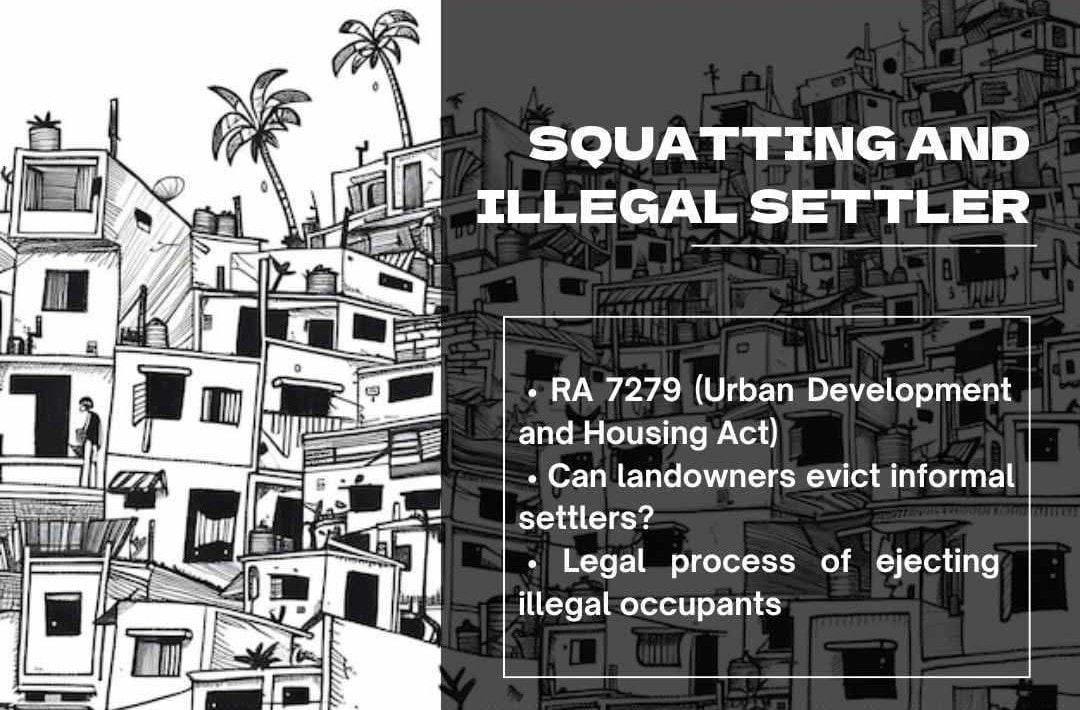You finally scraped together enough money to buy a piece of land, a title, a future. Then you drive by, and there are structures on it. People. They’re living on your property. What do you do? Who is the law actually protecting?
Honestly, dealing with squatting, or what the government now politely calls “informal settlements,” is one of the most stressful, confusing, and emotionally draining things a homeowner can face. It feels like a violation, a theft of your future. But here’s the thing: you can’t just charge in and kick them out. The law is complicated because it has to balance your property rights with the desperate need for housing in our country.
Look, this isn’t about judging. This is about understanding the Urban Development and Housing Act (UDHA), or RA 7279, so you can protect your title and take the right legal steps. Let’s break down this complex, messy reality.

You Bought the Land, But Someone Lives There
It may surprise you, but the days of automatically filing a criminal case against every person living on your land are mostly over.
The Old Law Was Too Strict. Back in 1975, there was Presidential Decree (PD) No. 772. This law was very tough; it made squatting a criminal offense. Under the old law, certain offenses related to the unauthorized occupation of real property could also be prosecuted under the Revised Penal Code, such as usurpation or trespass. Many people felt it was unfair because it punished poor urban families who had no other place to live.
Because of this, Congress took action. In 1997, they passed Republic Act No. 8368, which repealed PD 772. This was a big change. Now, poor and homeless people who occupy land out of necessity are generally not committing a crime that would send them to jail. Criminal charges now mainly target professional squatters and organized groups involved in illegal activities. On the other hand, poor squatters usually face civil actions like eviction or demolition, but only after the proper legal steps are followed.
The Current Backbone: RA 7279
The real law you need to focus on is the Urban Development and Housing Act of 1992 (RA 7279). Think of the UDHA as the government’s dual-purpose tool: it aims to provide socialized housing for the underprivileged, but it also gives you, the legal owner, mechanisms to reclaim your land from those who abuse the system.
So, is simply occupying land illegal? In a sense, yes, it’s illegal possession. But is it a crime punishable by automatic imprisonment? Generally no. The law now directs its biggest penalties at those who exploit the poor and the housing system itself.
Who is Who? The Critical Distinction You Must Make
This is the most important part, so read carefully. You need to know exactly who you are dealing with because the law treats them very differently.
1. The Informal Settler Family (ISF)
This is the family that is genuinely underprivileged and homeless. They occupy the land because they have genuinely insufficient income to rent or buy legitimate housing. They are the ones the UDHA is primarily designed to help through relocation and social housing programs.
The Bottom Line: While they don’t have a right to your private property, they do have a right to due process and humane treatment. You can’t just bulldoze their home without following strict rules.
2. The Professional Squatter (The Criminals)
This is where the criminal penalties come into play. The law defines Professional Squatters with laser precision. They are the people who:
- Occupy land without consent, but they have sufficient income for legitimate housing. They’re exploiting the system, maybe building to rent out, or they just prefer to live rent-free.
- They were previously awarded a government home or lot (like from the NHA), but sold or transferred it and illegally moved into another urban area. They’re repeat offenders who abused the housing program.
3. The Syndicate
Squatting Syndicates are organized groups that profit from illegal occupation, often charging poor ISFs “rent” or protection money. They are criminals, plain and simple.
Unlike the ISF, the law allows for the summary eviction of professional squatters and syndicates. They can also face imprisonment and heavy fines under RA 7279. This is the exception where the occupation is a serious crime.
Protecting Your Title: Legal Actions for Landowners
Okay, you know the difference. Now, let’s talk action. Your first step, no matter what, is to confirm your Torrens Title.
Your Torrens-registered land acts like a strong shield for your ownership rights. It means that even if squatters have been on your land for 30 years or more, they cannot legally claim it as theirs. However, having the title isn’t enough; you still need to take action to regain control of your property.
You must act fast to avoid the headache of a long court battle. Your legal strategy depends on how they got there and how long they’ve been there:
1. Forcible Entry
It is when the squatters entered your property through force, intimidation, threat, stealth, or strategy (FISTS). They broke in or sneaked in while you were away. You must file this case in the Municipal Trial Court (MTC) within one year from the moment you discovered the entry. This is the fastest, simplest way to recover possession.
2. Unlawful Detainer
This is when you initially allowed or tolerated their presence. Maybe you let a friend stay there temporarily, or you didn’t mind a small structure at first. But now you’ve formally told them to leave, and they won’t. You must file this case in the MTC within one year from the date of your last formal written demand to vacate.
3. Accion Publiciana or Reivindicatoria
You missed the one-year deadline for the two summary cases above. Don’t panic, but you have a longer, more complicated fight ahead. You must file these recovery actions in the Regional Trial Court (RTC). This kind of case can take years, but it asks the court to declare that you have the better right to possession (Publiciana) or the actual ownership (Reivindicatoria).
| A word of advice: Before going to court, if the parties live in the same city or municipality, you usually have to go through the Barangay Justice System for mediation first. It’s a mandatory step. Don’t skip it! |
Eviction and Demolition: It Must Be Humane
This is where the social justice component of RA 7279 takes effect. The law understands that even if they are on your land illegally, they are still human beings.
You cannot use “self-help.” You can’t hire bouncers, cut the water, or demolish the structures yourself. If you do, you could face civil and even criminal penalties for illegal eviction.
Any eviction or demolition involving genuine ISFs must follow these three crucial mandates:
- 30-Day Written Notice: The affected occupants must receive a formal notice at least 30 days before the planned demolition.
- Adequate Consultation: The local government and housing agencies must hold consultations to discuss alternatives.
- Humane Relocation: The LGU, with help from agencies like the PCUP and NHA, must provide adequate and humane relocation (ideally on-site or in-city) or financial assistance before the demolition proceeds.
The Exception: Danger Zones. If the structures are located in clear danger zones (like riverbanks, waterways, or under power lines), the government can prioritize summary eviction to prevent loss of life. In these situations, professional squatters and squatting syndicates can be quickly removed from the property as the law allows. However, even then, the proper legal steps must be followed, including giving them official notice before eviction.
And look, if any public official tries to obstruct a legal eviction, tolerates professional squatters, or engages in corruption, they are also subject to severe penalties under the law. We need to hold people accountable on all sides.
A Final Word of Action
I know this is heavy. But here’s the actionable truth:
- If you are a landowner, make sure your land is Torrens-registered. If you see a single piece of wood on your property, file a legal action immediately to interrupt the one-year period. Your speed is your biggest defense.
- If you are a legitimate Informal Settler Family, know your rights. You cannot be evicted without the proper 30-day notice and the offer of humane relocation. Use the protection RA 7279 gives you.
The law isn’t perfect, but it gives you a clear path forward. Don’t fight this battle with emotion or force. Fight it with the right legal documents. Consult with a lawyer, figure out whether you’re filing a Forcible Entry or an Unlawful Detainer case, and act decisively. You can recover your property.
Take action now with HousingInteractive, the Philippines’ first dedicated property portal, offering comprehensive solutions to help you navigate property challenges so you can protect your rights and make informed decisions about your land and investments.

























